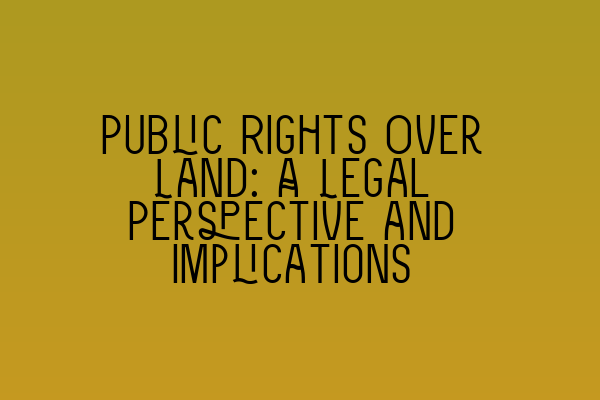Public Rights Over Land: A Legal Perspective and Implications
Public rights over land have long been a complex area of law, with a wide range of legal issues and implications. As a solicitor specializing in property law and land law, I often encounter questions and concerns regarding public rights over land and the associated legalities. In this blog post, I aim to provide a comprehensive overview of this topic, delving into the legal aspects and exploring the implications for landowners and the public.
Firstly, let’s define what public rights over land actually are. Public rights are the legal entitlements of the general public to use certain areas of land for specific purposes, even if the land is privately owned. These rights can be established through various legal mechanisms, such as statutory provisions or common law principles.
One common type of public right over land is the right of way. A right of way allows members of the public to pass over a particular piece of land, typically for the purpose of accessing another location. This can be in the form of a footpath, a bridleway, or even a road. The establishment and extent of a right of way can vary depending on the circumstances and the relevant legal principles.
Another important public right over land is the right to access foreshore and beaches. In many jurisdictions, the general public has the right to access and enjoy certain coastal areas, even if the underlying land is privately owned. This is often based on historical legal doctrines, such as the public trust doctrine, which recognizes that certain natural resources should be accessible to everyone.
Public rights over land can also extend to other activities such as fishing, hunting, or gathering certain resources. These rights are typically subject to regulations and restrictions to ensure proper management and conservation of natural resources.
Now that we have a basic understanding of public rights over land, let’s explore some of the legal implications and considerations for landowners. If you are a landowner, it is crucial to be aware of any public rights that may exist over your land, as they can restrict your use and control of the property. Understanding the scope of these rights can help you avoid potential legal disputes and ensure compliance with applicable laws and regulations.
One key aspect is the concept of “opposite rights.” Opposite rights refer to the rights of the landowner that coexist with the public rights over the land. For example, while the public may have a right of way over a particular pathway, the landowner retains the right to maintain and manage the land, including imposing reasonable restrictions on the use of the pathway.
It is essential for landowners to properly identify and document any public rights over their land. This can be achieved through a careful examination of historical records, land surveys, and legal research. Seeking professional legal advice from a solicitor specializing in property law can be invaluable in this process, as they can help navigate the complex legal landscape and provide guidance on the best course of action.
Moreover, it is crucial for landowners to understand that public rights over land can be modified or even extinguished under certain circumstances. For example, changes in land use, development projects, or legislative reforms can affect the scope and extent of public rights. Staying informed of any relevant legal changes and engaging in proactive discussions with local authorities and relevant stakeholders can help protect your rights as a landowner.
Furthermore, it is worth noting that public rights over land can have significant implications for land development and planning. Local authorities and planning committees often take into consideration public rights when making decisions on land use and development applications. Understanding the existing public rights over your land and their potential impact on development plans is crucial for successful project management.
In conclusion, public rights over land are a complex and multifaceted area of law with important implications for landowners and the general public. Proper understanding and management of these rights are essential to ensure compliance with the law, avoid legal disputes, and make informed decisions regarding land use and development. If you have any concerns or questions regarding public rights over your land, consult with a solicitor specializing in property law to ensure the protection of your rights and interests.
Want to learn more about related legal topics? Check out these articles:
– Understanding Contractual Capacity: Rights and Limitations
– Interactive SQE Mock Tests for Contract Law: Test Your Knowledge
– Join Our SQE Contract Law Webinars: Expert Insights and Guidance
– Contract Law Reforms: An Analysis of Recent Changes
– Parties in a Contract: Rights and Responsibilities
At SQE Property Law & Land Law, we provide expert legal services in property law and land law. Contact us today to schedule a consultation or find out more about our range of services.
